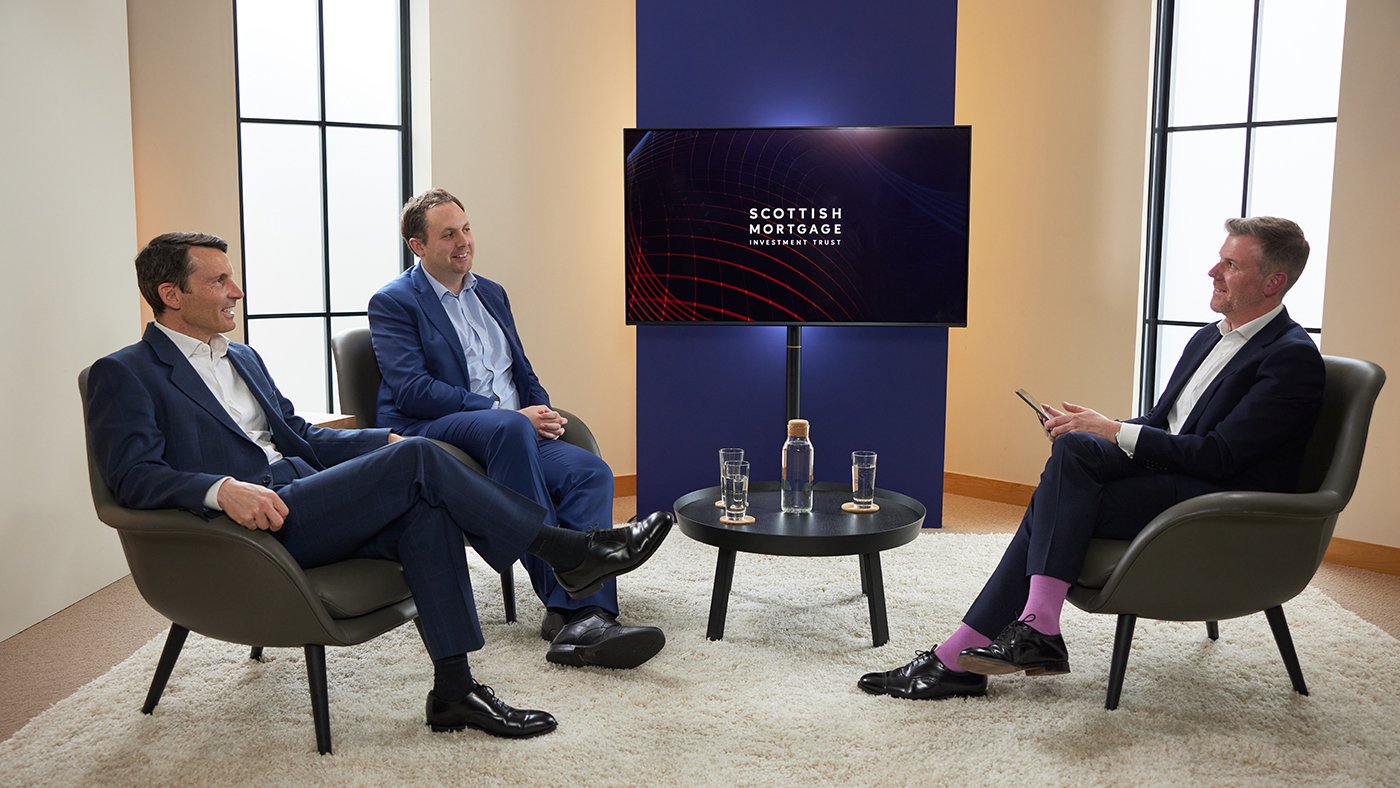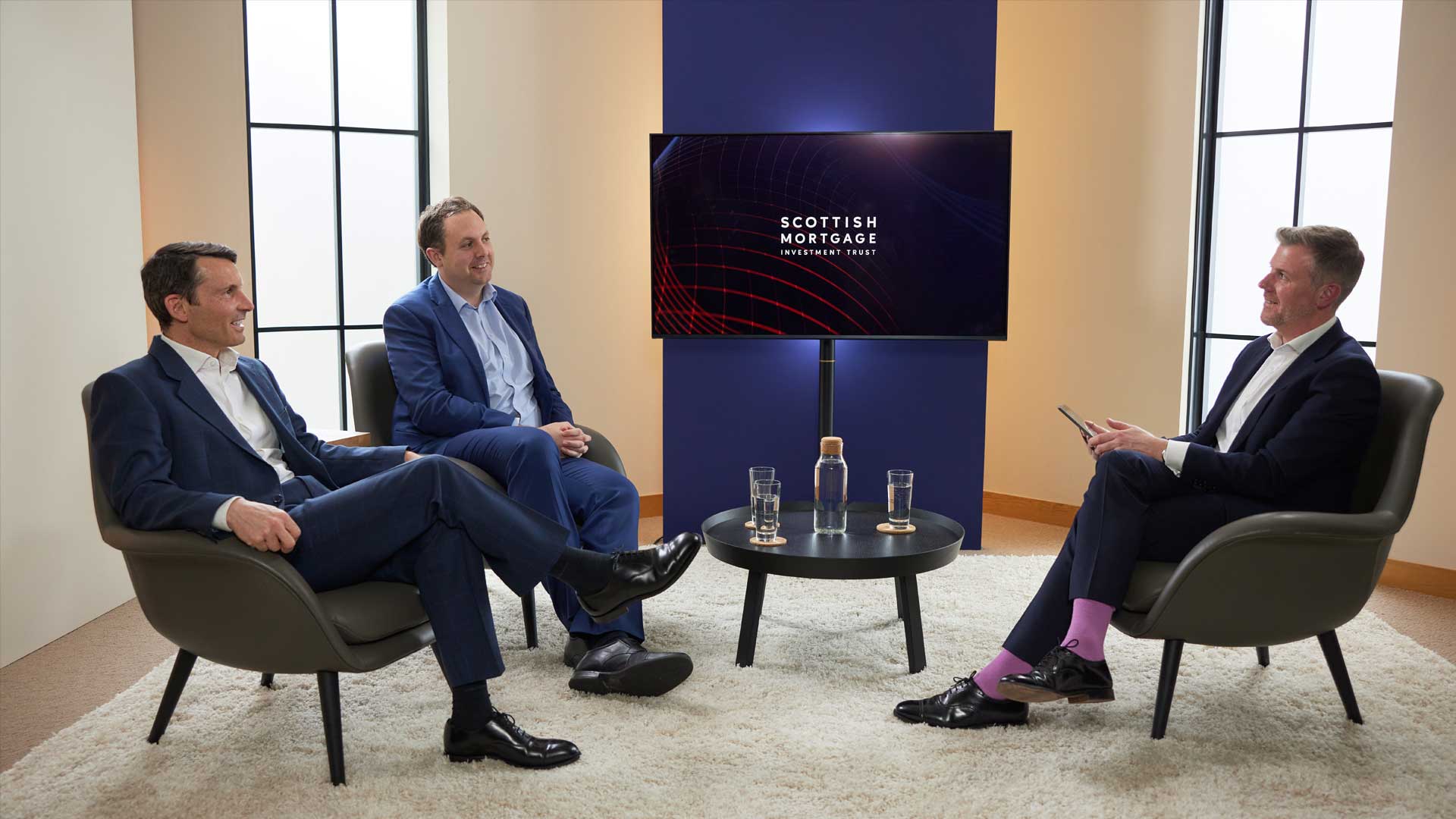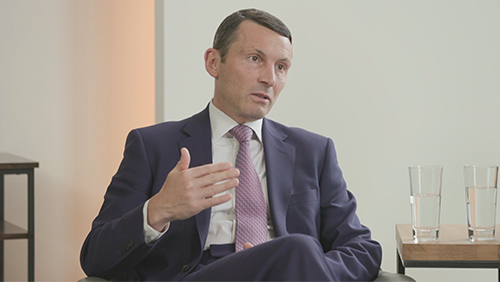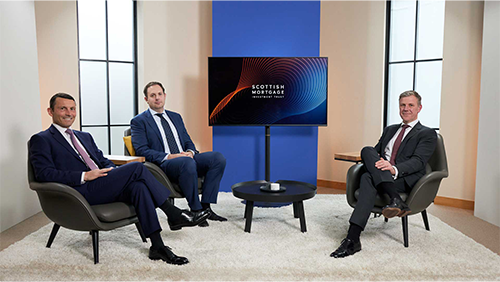April 2024
Article
6 minutes
Investor webinar: written overview
Stewart Heggie – Commercial Director
- Tom Slater, Scottish Mortgage manager, explains the reasoning behind the Board’s decision to make at least £1bn available over the next two years to buy back shares.
- Slater and deputy manager Lawrence Burns are optimistic about the prospects for the private portfolio, with many companies in a healthy position for public listing.
- The managers are excited by the growth prospects of the portfolio based on the underlying progress and strong balance sheets of the companies within it.

As with any investment, your capital is at risk.
During a recent webinar, Scottish Mortgage managers Tom Slater and Lawrence Burns answered shareholders’ questions live. They covered the recent share buyback announcement, artificial intelligence (AI), the valuation of private companies and their enthusiasm for the growth prospects of companies in the portfolio.
Tackling the discount with share buybacks
Slater opened by explaining the rationale behind the recent decision to make at least £1bn available for share buybacks over the next two years. “We have a longstanding commitment to use buybacks to keep the share price and the asset value of the trust as close together as we can under normal market conditions.” he said. This is part of a strategy to ensuring any shareholder value is maximised.
Over the challenging market conditions of the past two years the Trust’s shares traded at a discount to net asset value. During that period, the Board and managers have been actively considering increasing the level of buybacks.
When allocating capital over that period, they considered a range of factors including, but not limited to, the level of gearing, exposure to private investments and general market conditions.
A balance was struck. The Trust bought back over £350m of its own shares, further strengthened its balance sheet by paying down over £400m in debt and supported follow-on fundraisings for some private companies.
Having further strengthened the Trust’s own balance sheet strength and when taking into consideration the managers' increasing conviction in the underlying portfolio the Board feel it is the right time to take concerted action to address the discount to net asset value at which the Trust’s shares continue to trade.
The decision does not reflect the recent press statement that Elliott Advisers owns 5 per cent of the Trust’s shares. Slater commented that although conversations with the hedge fund have been constructive and aligned, the Board makes decisions based on the interests of all shareholders.

Watch the full webinar to hear Tom Slater and Lawrence Burns discuss the key topics on shareholders' minds.
Burns also allayed concern that the buyback increasing could be an indication of a lack of new investment ideas.
“We definitely don’t think that’s the case.” Burns used the example of a Korean ecommerce company they have been interested in for a long time but whose initial public offering (IPO) valuation was too rich. Two years later, it has 20 per cent plus revenue growth year over year; it has gone from heavy loss-making to generating £1-2bn in free cash flow. With shares 60 – 70 per cent cheaper than they were, the Trust took a small holding.
He also referred to a meeting he and Slater had recently on the very topic of new ideas:
“We had several that we were discussing very enthusiastically for the portfolio…rather than us being low on new ideas, actually it feels like we have more now than we have had over the last couple of years, if anything.”
AI opportunities broaden
AI and technological progress are key drivers for identifying new investment opportunities and enhancing the competitive position of companies within the portfolio.
As well as creating new business models, Burns explained that AI’s impact would be much broader than the market currently imagines: “AI is providing a toolset for a wide range of companies, particularly those that are innovative, data-rich, technology-focused and can leverage that toolkit to improve competitive position to improve market opportunities.”
Burns broke down the opportunities within Scottish Mortgage into several layers, starting with the ‘enablers’ – companies such as NVIDIA, whose semiconductor chips make AI possible and ASML, whose lithography technology enables companies to make the most advanced chips.
Another layer would be cloud service providers such as Amazon Web Services and Snowflake, helping enterprise customers take advantage of different AI tools in the cloud.
Beneath that is a broader area where AI is part of a company’s toolset. Tesla, for example, has a huge opportunity to use AI to accelerate what it’s doing with robotics and autonomous driving.
Spotify is also currently testing AI voice translation to clone and translate a podcaster’s voice into multiple languages.
Slater agreed demand for AI was infinite, “What business in what industry would not benefit from additional intelligence in its systems?” He suggested that what matters is “At what price can you supply that demand? Because that’s what will determine the size of the market.”
Valuing private companies
Approximately 26 per cent of the Trust is invested in private companies, with the recent lack of IPOs part of the reason why we have remained close to our 30 per cent limit. However, after two years of little or no activity, the IPO market shows signs of life again. On a recent investment trip to Asia, several companies were in touch to discuss plans for an IPO.
Two-thirds of the Trust’s private company exposure comes from the top ten companies, and nearly half of those by weight are profitable or generate cash. “That’s a significant surge in cash flow from the private portfolio versus 12 or 18 months ago,” noted Slater. It also means they will be well-placed to IPO when the market conditions are right, which he hopes will serve to validate the valuations of private companies in the portfolio.
He expressed his enthusiasm for Scottish Mortgage’s largest private holding, SpaceX, which he believes is conservatively valued given how it has grown the launch market in such a short period and the lack of significant competitors. Its satellite telecoms business is also growing rapidly and is generating cash.
Portfolio update
Slater did not shy away from the Trust’s challenges. He said, “We’re clear about what we’re trying to do. We’re trying to invest in the world’s greatest growth companies. So, when you go through a period of unexpected rate rises, a completely seismic shift in the interest rate regime, we’re vulnerable to that. It’s an intrinsic component of what we do.”
The response has not been to shift the investment philosophy or approach to growth investing. Still, it has made the managers reflect more on the robustness and resilience of the companies today and not just their future growth prospects.
Scottish Mortgage has limited Indian exposure through HDFC Bank. Burns noted that part of his recent investment trip was to find a broader range of growth companies. However, several of the portfolio’s large tech companies, such as Meta, do benefit from India's scale and opportunity.
Several questions centred on individual companies, including Moderna and autonomous trucking company Aurora, both of which have been covered in recent Invest in Progress podcast episodes.

Listen to Invest in Progress to hear directly from the founders and entrepreneurs behind some of Scottish Mortgage's most exciting companies.
While the share price of Moderna has been linked to its Covid vaccine, the managers’ enthusiasm is based on its technology now being a validated platform for developing vaccines for other diseases, including flu, RSV and cancer. Slater anticipated that upcoming clinical trial results could help change sentiment around the stock.
Aurora is advancing autonomous trucking. The company’s “superpower” is creating an autonomous ecosystem by building partnerships with truck manufacturers, suppliers and shippers.
With the road transport business in the US a huge market, the company has significant growth potential, and we can expect to see autonomous trucks on the highways in the next year or so.
Another question centred on synthetic biology company Ginkgo Bioworks. Slater is optimistic that it will succeed in educating potential clients about the wide commercial applications of its advanced technology for designing, modifying, and optimising organisms.
While the market has struggled to appreciate the value of Ginkgo’s projects, which mostly comes from downstream royalties once the product is produced, the managers believe the potential of the technology remains undimmed.
Another company covered was Ferrari. It offers exposure to a luxury company that has been able to draw on the legacy of racing history and glory to sell to price-insensitive customers.
The managers addressed a recent Financial Times article raising concerns about Chinese internet company PDD Holdings (Pinduoduo). Accepting that PDD is “unconventional,” they concluded, “There are things that we have to monitor and be careful of, but unconventionality alone doesn’t lead to it being a bad investment outcome.”
The managers called out the “truly extraordinary individuals” they are backing through the Trust’s holdings, singling out Wang Xing of the Chinese shopping platform Meituan for praise.
“[These are founder leaders] motivated to build a business and make an impact over the very long term and that face huge opportunity sets, that are now being given a new toolset with AI to improve what they do at a rate that we would have thought impossible five or ten years ago,” said Burns.
Optimism for future growth
Scottish Mortgage has faced three factors hampering performance in recent years: valuation compression, slow growth, and declining earnings estimates. Despite this, the underlying progress of its companies has been consistent. That bodes well, as these detractors appear to be switching to drive share price performance.
The managers are optimistic about the future, driven by the strong balance sheet, the healthy state of private companies, and the potential of AI to create new business models and investment opportunities.
The webinar ended with the managers highlighting the technological progress they are seeing, which convinces them that this could be a great era for growth investing, adding that they both had increased their personal holdings in Scottish Mortgage.
Annual Past Performance To 31 December each year (net%)
| 2019 | 2020 | 2021 | 2022 | 2023 | |
| Scottish Mortgage Investment Trust plc | 24.8 | 110.5 | 10.5 | -45.7 | 12.5 |
Source: Morningstar, share price, total return, sterling.
Risk factors
The trust invests in overseas securities. Changes in the rates of exchange may also cause the value of your investment (and any income it may pay) to go down or up.
Unlisted investments such as private companies, in which the Trust has a significant investment, can increase risk. These assets may be more difficult to sell, so changes in their prices may be greater.
The Trust invests in emerging markets, which includes China, where difficulties with market volatility, political and economic instability including the risk of market shutdown, trading, liquidity, settlement, corporate governance, regulation, legislation and taxation could arise, resulting in a negative impact on the value of your investment.
The trust can borrow money to make further investments (sometimes known as “gearing” or “leverage”). The risk is that when this money is repaid by the trust, the value of the investments may not be enough to cover the borrowing and interest costs, and the trust will make a loss. If the trust's investments fall in value, any invested borrowings will increase the amount of this loss.
The trust can buy back its own shares. The risks from borrowing, referred to above, are increased when a trust buys back its own shares.
About the author - Stewart Heggie
Commercial Director
Stewart Heggie is a commercial director, focused on serving the needs of Scottish Mortgage shareholders. Prior to joining in 2019, he spent 15 years as a discretionary fund manager, before which he helped design the investment platform of a large UK bank. Nowadays, Stewart enjoys a varied role that spans across several areas involved in running a listed investment company. He plays a key role in developing the company’s strategic direction and broadening out its ownership. Beyond that, he works closely with the managers to maintain current portfolio knowledge; regularly meets with potential and existing overseas shareholders; and acts as a key contact for the board of directors.
Important information
This communication was produced and approved at the time stated and may not have been updated subsequently. It represents views held at the time of production and may not reflect current thinking.
This content does not constitute, and is not subject to the protections afforded to, independent research. Baillie Gifford and its staff may have dealt in the investments concerned. The views expressed are not statements of fact and should not be considered as advice or a recommendation to buy, sell or hold a particular investment.
Baillie Gifford & Co and Baillie Gifford & Co Limited are authorised and regulated by the Financial Conduct Authority (FCA). The investment trusts managed by Baillie Gifford & Co Limited are listed on the London Stock Exchange and are not authorised or regulated by the FCA.
A Key Information Document is available by visiting our Documents page.
Any images used in this content are for illustrative purposes only.









